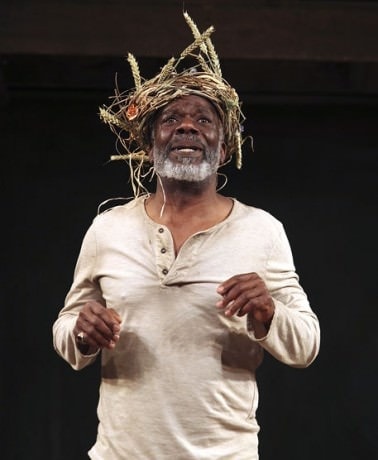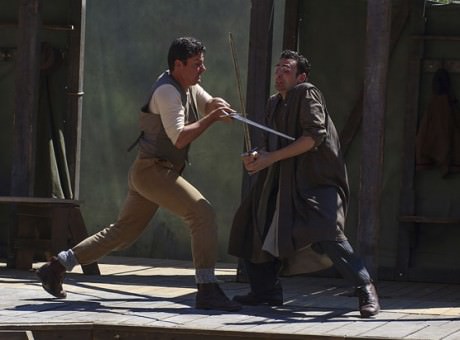The power of Shakespeare’s tragedies lies in their ability to speak to both the political and the personal. King Lear is an exemplar in this regard. Not only does the empire collapse and the royal family disintegrate, but the king himself moves rapidly from fit to feeble to funeral pyre.

Globe Theatre on Tour has brought its production of King Lear to the Folger Theatre as the first leg of a four-month visit of the USA. A troupe of eight actors playing two dozen characters performs the tragedy with house lights up and fourth wall down, returning the tale’s high drama to its folklorish roots, and the results are fabulous.
This Lear triumphs not for its catharsis, purging us and king of pity and fear, but for the simplicity of its presentation brought forth in spitting-distance before our eyes and ears. We see the story and hear the moans of anguish and recognize how often we ourselves fall prey to pretty words uttered to betray.
You see, Shakespeare’s Lear is all about the power of language, and Washington is all about the power of language, and in Lear, and in Washington, men and women are taught not to believe their lying eyes but to listen to the tales woven by, in Lear‘s case, deceiving children, and in our case, high priced PR firms, speech writers, and lobbyists.
When Lear is stripped down to its essentials, and its story presented bare upon the stage, we have a retiring King, played with wonderful emotional range by Joseph Marcell, who wants his three daughters to proclaim their love and admiration for him. In return, he will dole out his kingdom accordingly.
His eldest, Goneril, played with supreme bitchiness by Gwendolen Chatfield, seizes the opportunity to conjure a speech of superlatives. She tells her father that her love knows no bounds. In fact, she loves him so much that her mouth cannot even form the words; yet, of course, they do.
His middle daughter, Regan, played coyly by Shanaya Rafaat, stumbles at first, merely seconding her sister’s fine yet inadequate words. When she sees her father’s displeasure, however, she quickly adds: “Only she comes too short: that I profess myself an enemy to all other joys.” Lear emotes, overjoyed by her hyperbolic proclamation.
And the game is set, as well as the tone of this fine production. You will find no somberness here. This Lear freely mixes grandeur with buffoonery.
Next up in Lear’s game of inheritance is his most beloved daughter, Cordelia, played by Bethan Cullinane. Ms. Cullinane’s Cordelia is ferociously honest, which in the world of politics is the very stuff of tragedy.
“I love your majesty according to my bond; nor more nor less.” And with that bit of simple honest speech the House of Lear comes crumbling down.
From this main storyline, one might point out that responsibility for the tragedy in Lear lies solely with Cordelia’s obsession with honesty and her unwillingness to tell her father what he so desperately wants to hear: the flowery language of admiration and love. So what if the emperor has no clothes? Tell the old man that he is loved more than life itself and the kingdom continues, albeit divided into thirds. Cordelia and her virtue will have none of it.
“Nothing will become of nothing,” the king roars at his honest child, referring to her inheritance. Ironically, her honest “nothing” will beget a “Leardom” reduced to nothing more.
Paralleling Lear’s fall, is the fall of the Earl of Gloucester, played with good sense by John Stahl. Gloucester has a fine, if nerdy, bookish son, Edgar, played adroitly by Alex Mugnaioni.
Gloucester’s other son, Edmund, is a bastard (as in born out of wedlock). Played slyly by Daniel Pirrie, this Edmund does not like the fact that the circumstances of his conception has landed him second class citizen status in England. So to gain a dukedom, he writes a letter portraying his brother as a traitor bent on killing his father.
Whereas Lear is deceived because of his desire to hear flowery nothings whispered by his daughters, Gloucester is deceived by his inability to recognize the truth as walking and acting and being right before of his eyes. Gloucester’s relation to his eyes is, indeed, the stuff of tragedy, and of the darkest comedy imaginable (but for that, you will have to see the show yourself).
The one adult who is not swept up in the logocentric world swirling around the kingdom is the good Earl of Kent, played steadfastly by Bill Nash. Though banished for his honest appraisal of Lear’s foolishness with Cordelia, he disguises himself so as to stay in the king’s service; but alas, in the end he can do nothing to stop the tragic necessity triggered by Lear’s unwillingness to hear the truth about love.
The true beauty of this production lies not in the brilliance of individual performances, though Marcell does indeed give a fantastic one as Lear. As directed by Bill Buckhurst, this troupe of traveling players plays multiple characters and in a style that undercuts any desire on our part to willingly suspend our disbelief. We see the simple sets and costumes, designed by Jonathan Fensom, and know they are the actors’ tools for revealing a story’s ins and outs.
Even before the first line is uttered actors emerge from backstage to welcome us, the audience, to the theatre. They embrace our attendance, and in so doing we get to know once another. Such is not the stuff of theatrical hallucination. As a result, we experience their performance as performance. The fact that all the actors, except Marcell with his Lear, play multiple characters, exiting one portal as Oswald–for example–only to suddenly enter another portal as Edmund (and done so, I might add, with nary a moment of confusion), only adds to the theatricality of the event.

The delightful songs and music, composed by Alex Silverman, further add to that theatricality, as well as to the comic sensibility that pervades this otherwise gloomy, bodies-strewn-about-the-stage play.
Fight Director Kevin McCurdy has given us some nifty sword play and choreographer Georgina Lamb just a wee bit of dance to spice up an evening of entertaining fare.
And that in the end is what this production of King Lear asks of its audience: enjoy yourselves. To be sure, there are always lessons to be learned and emotions to be purged: looking at poor Lear and his rapid demise from power to pauper I am sure sent chills through every baby boomer in attendance. Like any good Greek tragic trilogy, once learned and purged, there is nothing like a Satyr and a good dance to cleanse the mental pallet. Unfortunately, the wine had to wait until we got home.
Running Time: Approximately 2 hours and 50 minutes, with one 15-minute intermission.
King Lear plays only through September 21, 2014 at Folger Theatre at the Folger Shakespeare Library—201 East Capitol Street, SE, in Washington, DC. For tickets, call the box office at (202) 544-7077, or purchase them online.





